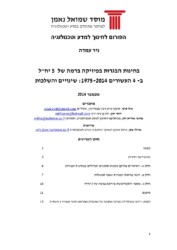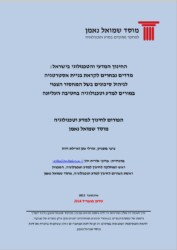The Forum for Science and Technology Education started its activities in 2013. The purpose of the forum is to establish and promote cooperation between different sectors in Israel in order to foster K-12 science and technology education. The Neaman Institute decided to focus on this topic due to the importance attributed to science and technology education in Israel for the future of the state and the need to increase the number of high-school pupils who choose to study these subjects on the AP level.
As a background for the forum’s discussions, a report was prepared. Its purpose is to create the basis for a risk management strategy in relation to the expected shortage of teachers in STEM (science, technology, engineering and Mathematics) subjects.
The report consists of six chapters and presents a model to forecast the number of teachers required in the future for teaching STEM in Israel under three scenarios:
– The percentage of students in high schools who study S&T subjects does not change; in this case no shortage of teachers is expected.
– The percentage of students in physics, chemistry, computer science and technological subjects is multiplied; in this case there is a shortage of teachers.
– A quarter of the students in high schools study physics and/or chemistry and/or computer science and/or a technological profession; in this case there is a serious shortage of teachers.
On the basis of the report, the two major challenges faced today by S&T education in Israel are:
a. the anticipated shortage of teachers in S&T subjects.
b. the relatively small number of students in technological education.
These two challenges are interrelated and the solution for both can be found in teachers with excellent engineering and scientific background. One of the report recommendations is to design training programs for those who have an excellent engineering and science background and who are interested in considering integration into the education system at some stage of their professional development.
In 2014, the Forum focused on the matriculation exams in physics, at the level of 5 study units in the last four decades, 1975-2014, and examined the implications of the changes that have occurred in the matriculation exam. The findings revealed that, among other things, the nature of the exam has changed over the years. Since an increase in the number of physics students is first and foremost a national necessity, and in light of the fact that the number of learners is not growing, one of the report’s recommendations is to think extensively about appropriate ways to increase the number physics students at the level of 5 study units.
As a background for the forum’s discussions, a report was prepared titled “Science and Technology Education in Israel: Selected Indicators towards Building a Risk Management Strategy for the Expected Shortage of High School Teachers in Science and Technology”. The purpose of the report was to create a basis for developing a risk management strategy with respect to the anticipated shortage of teachers of science and technology (S&T).
On the basis of this report’s, two major challenges facing the S&T education in Israel were defined: the expected shortage of S&T teachers and the relatively small number of students in technological education. In 2015, the forum’s activity focused on exploring a risk management strategy of S&T education in Israel.



